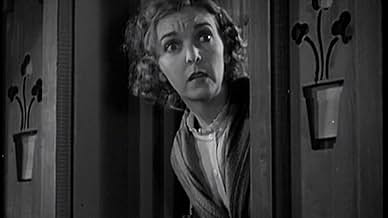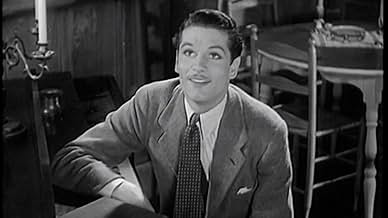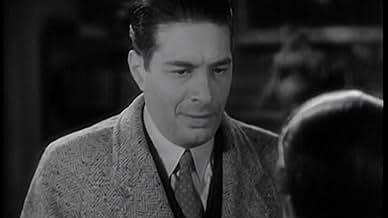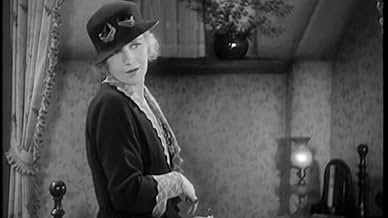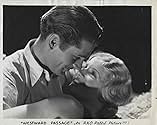A struggling writer divorces his wife to pursue his career without interference, but they meet in Europe years later after she has remarried.A struggling writer divorces his wife to pursue his career without interference, but they meet in Europe years later after she has remarried.A struggling writer divorces his wife to pursue his career without interference, but they meet in Europe years later after she has remarried.
- Director
- Writers
- Stars
Lita Chevret
- Party Guest
- (uncredited)
Joyce Compton
- Lillie
- (uncredited)
Julie Haydon
- Bridesmaid
- (uncredited)
Carl M. Leviness
- Ship Passenger
- (uncredited)
- Director
- Writers
- All cast & crew
- Production, box office & more at IMDbPro
Featured reviews
I liked this movie, in fact I like very much Ann Harding's "natural" acting style, her fresh appearance, her smile, she's a great (& forgotten) talent, and she needs to be rediscovered, as the excellent actress (& star) she was in the early thirties. Thanks to TCM, I've been able myself to "discover" her luminous presence on the silver screen, because few of her films are available on any format, on the market.
Here she plays nicely opposite a very young Laurence Olivier, and they have wonderful chemistry, as a struggling couple of newlyweds, trying to cope with their "incompatibilities", he's an aspiring writer and she tries hard to be the "devoted" wife.
Nice support from Irving Pichel as Harding's eternal suitor, Juliette Compton as Harding's sophisticated cousin,... check for Bonita Granville's first film role, as Harding & Olivier's daughter, who looks very, very pretty...she's already got plenty of talent & that "je ne sais quois" that made her a child star, later in the decade, as the brat in Goldwyn's 1936 "These Three".
A quality picture.
Here she plays nicely opposite a very young Laurence Olivier, and they have wonderful chemistry, as a struggling couple of newlyweds, trying to cope with their "incompatibilities", he's an aspiring writer and she tries hard to be the "devoted" wife.
Nice support from Irving Pichel as Harding's eternal suitor, Juliette Compton as Harding's sophisticated cousin,... check for Bonita Granville's first film role, as Harding & Olivier's daughter, who looks very, very pretty...she's already got plenty of talent & that "je ne sais quois" that made her a child star, later in the decade, as the brat in Goldwyn's 1936 "These Three".
A quality picture.
This "drama" comes across more as a comedy of manners since a) most of the story concerns the romance between two characters and b) I believe the intent was to focus on the dialogue, especially between those two characters. Released in 1932, "Westward Passage" came not long after the advent of talkies, and I think studios were still learning about the capabilities of scripts not limited by title cards.
Since this film is only 73 minutes in length, the transition between scenes and the passage of time are rather choppy, short-changing what might have been a more interesting story if it were developed more.
The primary characters are Olivia Allen (Ann Harding) and Nick Allen (Laurence Olivier), who we first meet as giggly newlyweds arriving at the inn of Mrs. Truesdale (Zasu Pitts).
Suddenly the newlyweds are dullyweds, living in a cramped flat, dealing with the realities of life. Nick, a writer, feels inhibited by his lifestyle and harangued by his editor, who wants him to add a happy ending to his manuscript. What does this portend for our lovebirds, we might wonder? Suddenly, baby makes three and Nick is thrust into the tedious responsibilities of fatherhood. Ill feelings ensue.
The center of the conflict is Nick's preoccupation with the idea that an artist must live a solitary life to create real art, unhampered by the quotidian aspects of life. At the same time, the Allens love each other. It seems love and art are incompatible.
Nick loses Olivia, then tries to woo her back, quoting "Paradise Lost" and singing "What'll I do". Olivia displays a resolution to always be proper, but her love for Nick--that literary bad boy--is undeniable and, like love sometimes is, unfathomable.
If you are wondering "What'll they do?" and "will paradise be regained?" you will have to watch this film that is very representative of its time, even if it could be much smoother. The dialogue contains some clever lines, but not enough to earn this film high marks.
Since this film is only 73 minutes in length, the transition between scenes and the passage of time are rather choppy, short-changing what might have been a more interesting story if it were developed more.
The primary characters are Olivia Allen (Ann Harding) and Nick Allen (Laurence Olivier), who we first meet as giggly newlyweds arriving at the inn of Mrs. Truesdale (Zasu Pitts).
Suddenly the newlyweds are dullyweds, living in a cramped flat, dealing with the realities of life. Nick, a writer, feels inhibited by his lifestyle and harangued by his editor, who wants him to add a happy ending to his manuscript. What does this portend for our lovebirds, we might wonder? Suddenly, baby makes three and Nick is thrust into the tedious responsibilities of fatherhood. Ill feelings ensue.
The center of the conflict is Nick's preoccupation with the idea that an artist must live a solitary life to create real art, unhampered by the quotidian aspects of life. At the same time, the Allens love each other. It seems love and art are incompatible.
Nick loses Olivia, then tries to woo her back, quoting "Paradise Lost" and singing "What'll I do". Olivia displays a resolution to always be proper, but her love for Nick--that literary bad boy--is undeniable and, like love sometimes is, unfathomable.
If you are wondering "What'll they do?" and "will paradise be regained?" you will have to watch this film that is very representative of its time, even if it could be much smoother. The dialogue contains some clever lines, but not enough to earn this film high marks.
Ann Harding and Laurence Olivier are madly-in-love newlyweds who run into marital discord when she realizes he's a frustrated writer and a royal jerk. Their decision to have a child only makes things worse, and Olivier eventually abandons them. Harding turns to wealthy suitor Irving Pichel who has always loved her. Several years later, the happily married Harding runs into Olivier again. Now he's a successful writer, and attempts to rekindle their romance.
I watched this for Olivier, and he's terrible here. I'm not sure if the filmmakers wanted his character to come across as a completely repellent lout, but that's how he turned out, obnoxious, irritating and without any real redeeming qualities. I was left wondering what Harding saw in him. Olivier would give up trying to be a Hollywood star not too long after this and turn his attention to the stage where he would build his reputation. That was a good call on his part. However, this film does allow for the unlikely screen teaming of Olivier with Zasu Pitts.
I watched this for Olivier, and he's terrible here. I'm not sure if the filmmakers wanted his character to come across as a completely repellent lout, but that's how he turned out, obnoxious, irritating and without any real redeeming qualities. I was left wondering what Harding saw in him. Olivier would give up trying to be a Hollywood star not too long after this and turn his attention to the stage where he would build his reputation. That was a good call on his part. However, this film does allow for the unlikely screen teaming of Olivier with Zasu Pitts.
Very odd story about love and marriage and responsibility that does features some good acting by Ann Harding, Laurence Olivier, Zasu Pitts, Irving Pichel, Irene Purcell, and Juliette Compton, but the characters don't seem to be very bright.
I assume this was a very "smart" stage play but it just doesn't wash on screen. Harding, a big star in the early 30s, usually plays very smart, very classy women but here she's rather a dope. Olivier plays a selfish fool who keeps trying to be charming, and is! Ultimately the total unreality of the central characters overwashes the best of intentions and good acting. The divorce is not very believable, but the re-marriage is absurd.
Also co-stars Bonita Granville, Herman Bing, Ethel Griffies, Florence Roberts, Florence Lake, Edgar Kennedy, and Don Alvarado.
I assume this was a very "smart" stage play but it just doesn't wash on screen. Harding, a big star in the early 30s, usually plays very smart, very classy women but here she's rather a dope. Olivier plays a selfish fool who keeps trying to be charming, and is! Ultimately the total unreality of the central characters overwashes the best of intentions and good acting. The divorce is not very believable, but the re-marriage is absurd.
Also co-stars Bonita Granville, Herman Bing, Ethel Griffies, Florence Roberts, Florence Lake, Edgar Kennedy, and Don Alvarado.
No one can deny that Ann Harding was something to look at, and that is about all this film has to offer. Her co-star is a very young mustachioed Laurence Olivier working very hard to make something of an unconvincingly written character -specifically, a high-strung novelist who resents churning out hack material for quick money to pay the bills while living in a small apartment with his wife (Harding) and a baby daughter. Eventually he can take no more, divorces his wife and goes off to write what he pleases in peace, leaving his wife to marry a long-time admirer (Irving Pichel) who provides her with money and status even though she is not in love with him. Years later the estranged couple meets again in Lucerne. By now he is a successful and famous novelist and impulsively decides to wrest back the woman he had deserted. Throughout the proceedings they bicker and make up with tiring frequency. The movie is mostly talk in the Noel Coward style but without the Coward sparkle. The fights and reconciliations, including the reuniting of a divorced couple at a classy resort, are very reminiscent of Coward's "Private Lives" which had been filmed with disastrous results the year before. As in "Lives," the couple even plays and sings a song from time to time, in this case "What'll I Do?" In short, this is good if you like watching Harding, a great screen beauty, and examining the meticulous craftsmanship of Olivier. Otherwise it's a leaden and witless talkathon.
Did you know
- TriviaTheatrical movie debut of Bonita Granville (Little Olivia Allen (age 10)).
- GoofsNick's telegram congratulating Olivia and Harry on their marriage is dated May 10 1928. Later scenes are supposed to take place six years later, despite the film having been released in 1932.
- ConnectionsReferenced in The Complete Citizen Kane (1991)
- SoundtracksThe Wedding March
(uncredited)
from "A Midsummer Night's Dream"
Music by Felix Mendelssohn
Played by Laurence Olivier on the piano
Details
- Runtime1 hour 13 minutes
- Color
- Aspect ratio
- 1.37 : 1
Contribute to this page
Suggest an edit or add missing content

